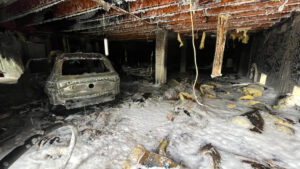This story was originally published by Grist. Sign up for Grist’s weekly newsletter here.
By Tik Root, Grist
When a hurricane like Helene or Milton ravages coastal communities, already-strained first responders face a novel, and growing, threat: the lithium-ion batteries that power electric vehicles, e-bikes and countless gadgets. When exposed to the salty water of a storm surge, they are at risk of bursting into flames — and taking an entire house with them.
“Anything that’s lithium-ion and exposed to salt water can have an issue,” said Bill Morelli, the fire chief in Seminole, Florida, and the bigger the battery, the greater the threat. That’s what makes EVs especially hazardous. “(The problem) has expanded as they continue to be more and more popular.”
It is not yet clear how many vehicles might have caught fire in the wake of Hurricane Milton, which slammed into Tampa Bay on Wednesday, leaving at least 13 people dead and some 80,000 in shelters. But there have been 48 confirmed battery fires related to storm surge from Hurricane Helene, 11 of them associated with EVs.

Morelli’s crews fought three of them. St. Petersburg Fire Rescue reported at least two, one from an electric bike and another from a Mercedes-Benz EQB300 that led to what a fire department representative called “major damage to the home.” CNN and other outlets reported on a fire in Sarasota sparked by a Tesla Model X.
Overall, such fires are far from common. Idaho National Laboratory found that of the 3,000 to 5,000 electric vehicles damaged by Hurricane Ian in 2022, about three dozen caught fire. Public awareness of the risk has mounted since then, with officials up to and including Florida Gov. Ron DeSantis urging residents to move their EVs to higher ground ahead of storms. But the chemistry and construction of lithium-ion batteries make them especially prone to fires that are difficult for first responders to combat.
“They burn hot, they burn fast and they’re hard to extinguish,” Morelli said.
The battery in an EV is comprised of thousands of cells stacked and packed into a sealed enclosure. If salt water, which is particularly conductive, reaches the interior of a battery, it can cause a short circuit, which can generate excessive heat that jumps from cell to cell. “That’s called ‘thermal runaway,’” said Andrew Klock, senior manager of education and development at the National Fire Protection Association.
As a battery heats up, it releases flammable gases that can ignite. Once the car starts burning, methods of putting out traditional vehicle fires — such as foam or thermal blankets to smother the flames — aren’t as effective. “Lithium-ion batteries generate their own oxygen and heat when they are on fire,” Klock said. “You can’t starve the fire.“
Instead, first responders must direct high volumes of water at the battery pack as directly as possible in order to reduce the heat. The International Association of Fire Chiefs recommends having 3,000 to 8,000 gallons on hand — which can be difficult during a disaster, when hydrants may not be working properly and trucks have a limited supply aboard.
“They take tons and tons and tons and tons of water to extinguish,” said Morelli, who is working with other departments to acquire more thermal blankets. A ready supply of them could allow firefighters to smother the flames enough to move the car away from structures so it can burn itself out safely.
Klock said “training is paramount” to effectively fighting these fires. But of the roughly 1.2 million firefighters in the country, only 350,000 or so have completed the association’s training, he said. “There’s a lot of work to do.”
The danger doesn’t end when a storm passes, either. According to the Department of Transportation, “the time frame in which a damaged battery can ignite varies, from days to weeks,” which is one reason Tesla urges owners not to operate their vehicle until a dealer inspects it.
The Alliance for Automotive Innovation, which represents 44 automakers and suppliers, declined to comment but cited a letter it sent to Republican Sen. Rick Scott of Florida on the issue in 2022. It notes that “safety is a top priority for our members, which is why they have been engaged in long-standing efforts to address fire risks for both conventionally fueled vehicles and EVs.”
In the meantime, a range of efforts are underway to try to prevent these fires from occurring. The Federal Emergency Management Agency has funded research into emerging hazards of at-home battery storage systems. Other researchers are looking at how to make batteries safer, including Yang Yang, an associate professor of materials science and engineering at the University of Central Florida. His team developed a battery that, instead of fighting salt water, utilizes it as the main electrolyte.
“It can be soaked in the salty water and still works well,” said Yang, who started working on the project after living in Houston and Florida and seeing firsthand the problem floods present. While he said car companies have yet to contact him about his research, he’s optimistic that safer batteries could be on the market within the next few years.
Until then, storms like Helene and Milton may be among the biggest drivers of public attention to both the problem and prevention methods. Yang, for one, finds that possibility bittersweet at best: “I don’t want people to have any issues with their electric vehicles.”
This article originally appeared in Grist at https://grist.org/technology/helene-and-milton-reveal-an-emerging-challenge-for-first-responders-ev-batteries-catching-fire/. Banner photo: Submerged cars after a hurricane (iStock image).
Grist is a nonprofit, independent media organization dedicated to telling stories of climate solutions and a just future. Learn more at Grist.org.
Sign up for The Invading Sea newsletter by visiting here. If you are interested in submitting an opinion piece to The Invading Sea, email Editor Nathan Crabbe at ncrabbe@fau.edu.



